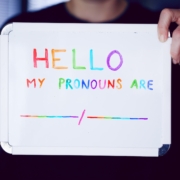What does ‘being yourself’ really mean?
The idea of ‘being yourself’ is a challenging one. When I really think about it, what does being truly, genuinely yourself mean exactly? Who am I and what do I have to do to be true to myself? My head immediately clouds with all sorts of thoughts… and there’s a follow up remark to each and every one, which goes something like this:
- Be true to yourself – that doesn’t pay the bills.
- Be honest with yourself and others – easier said than done.
- Say what you really think – I’m pretty sure people don’t always want to hear what I really think.
- Relax and let go – really? who’s going to do the weekly shop, drop off the kids, organise playdates, plan holidays, empty the dishwasher, clean the house, do the washing…?
- Stop worrying about what other people might think – but this is how society works – we create our own personal hell based on what we think other people think of us!
I’m being flippant but when life’s busy (which is most of the time) it’s easier to brush those thoughts away and allow my life to run on autopilot; governed by my social conditioning. This probably means most of the time I’m not being my authentic self, I’m fitting in.
Being me
I looked up the definition of ‘being’ and it said: ‘a person or thing that exists, or the state of existing’. This suggests just by virtue of having been born, I ‘be’, which would imply I already was me and ‘being myself’ right from the get-go. Until at some point I wasn’t. Until I became aware of the dictates of society and started conforming to other people’s expectations of me.
But if I reverse the question and ask when and how am I not being myself, I realise there’s a pattern to how my answer begins. I’m not being myself when I feel:
- ’I should be/do/have…’.
- ‘I have to be/do/have…’
- ‘I shouldn’t be/do/have…’
- ‘I need to be/do/have…’
- ‘I want to be/do/have…’
Each of these statements implies I’m lacking or coming up short in some way. They highlight where I think I don’t fit society’s mould or measure up to some fictional ideal I have of myself – my job, the way I dress, the way I behave, how sociable I am (we live in an extrovert society these days), how confident I am in myself and how authentic.
Fitting in
But why do we feel we have to fit in? Why do we feel we have to comply? It all boils down to fear. Of rejection or not being loved or liked or not being good enough.
And that’s a powerful reason to conform. Millions of people do it every day but it’s an inherent human flaw. We’ll never find true happiness by shoehorning ourselves into other people’s standards, circumstances or events. Why? Because society follows fashion and fashion is fickle. Minds, circumstances and events change and the goal posts keep moving.
This fuels the nagging fear that something’s missing in us or isn’t good enough or needs to be different, which creates the emotional void we’re seeking to fill. We’re basically looking for love in all the wrong places.
Letting go
So, what would life be like if I could let all that negative thinking go? If I stopped trying to change and contort myself, and was simply, honestly true to myself?
Well, I’d accept myself just as I am and not look to others or things outside of me to validate my self-worth or bolster my self-esteem. I’d know my value and self-worth by virtue of having been born – I exist as me.
- I’d be true to myself – I’d trust and follow my heart.
- I’d be honest with myself and others – I’d take responsibility and ownership for how I am.
- I’d say what I really think – with kindness and compassion.
- I’d be able to relax and go with the flow – I wouldn’t worry about what other people think because what others think of me is actually a reflection of them. Equally, I’ll reflect on what I think of others for the same reason – what I think of them is actually a reflection of me.
I’d be myself. There’s a certain courageous vulnerability and honour in that.





